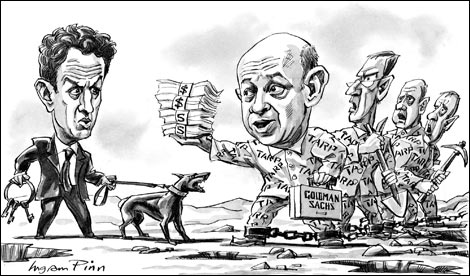
By Thomas Friedman
Excerpt:
CITIGROUP is lucky that Muammar el-Qaddafi was killed when he was. The Libyan leader’s death diverted attention from a lethal article involving Citigroup that deserved more attention because it helps to explain why many average Americans have expressed support for the Occupy Wall Street movement. The news was that Citigroup had to pay a $285 million fine to settle a case in which, with one hand, Citibank sold a package of toxic mortgage-backed securities to unsuspecting customers — securities that it knew were likely to go bust — and, with the other hand, shorted the same securities — that is, bet millions of dollars that they would go bust.
It doesn’t get any more immoral than this. As the Securities and Exchange Commission civil complaint noted, in 2007, Citigroup exercised “significant influence” over choosing $500 million of the $1 billion worth of assets in the deal, and the global bank deliberately chose collateralized debt obligations, or C.D.O.’s, built from mortgage loans almost sure to fail. According to The Wall Street Journal, the S.E.C. complaint quoted one unnamed C.D.O. trader outside Citigroup as describing the portfolio as resembling something your dog leaves on your neighbor’s lawn. “The deal became largely worthless within months of its creation,” The Journal added. “As a result, about 15 hedge funds, investment managers and other firms that invested in the deal lost hundreds of millions of dollars, while Citigroup made $160 million in fees and trading profits.”
Citigroup, which is under new and better management now, settled the case without admitting or denying any wrongdoing. James Stewart, a business columnist for The Times, noted that Citigroup’s flimflam made “Goldman Sachs mortgage traders look like Boy Scouts. In settling its fraud charges for $550 million last year, Goldman was accused by the S.E.C. of being the middleman in a similar deal, allowing the hedge fund manager John Paulson to help choose the mortgages and then bet against them without disclosing this to the other parties. Citigroup dispensed with a Paulson figure altogether, grabbing those lucrative roles for itself.” (Last Thursday, the U.S. District Court judge overseeing the case demanded that the S.E.C. explain how such serious securities fraud could end with the defendant neither admitting nor denying wrongdoing.)
This gets to the core of why all the anti-Wall Street groups around the globe are resonating. I was in Tahrir Square in Cairo for the fall of Hosni Mubarak, and one of the most striking things to me about that demonstration was how apolitical it was. When I talked to Egyptians, it was clear that what animated their protest, first and foremost, was not a quest for democracy — although that was surely a huge factor. It was a quest for “justice.” Many Egyptians were convinced that they lived in a deeply unjust society where the game had been rigged by the Mubarak family and its crony capitalists. Egypt shows what happens when a country adopts free-market capitalism without developing real rule of law and institutions.
But, then, what happened to us? Our financial industry has grown so large and rich it has corrupted our real institutions through political donations. As Senator Richard Durbin, an Illinois Democrat, bluntly said in a 2009 radio interview, despite having caused this crisis, these same financial firms “are still the most powerful lobby on Capitol Hill. And they, frankly, own the place.”